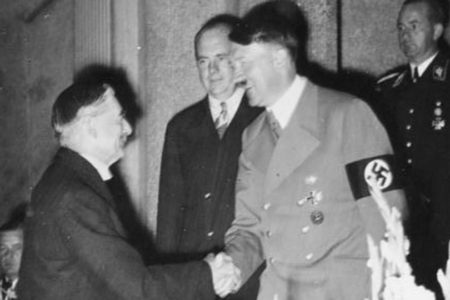The Day Rose-Colored Glasses Turned Green
On January 25 things looked pretty good for wishful thinkers who perpetually see the world through rose-colored glasses. The Palestinian election polls were showing a 10-point spread between Palestinian President Mahmoud Abbas’s Fatah and the terrorist organization Hamas—now referred to as a “resistance movement.” By day’s end, however, those rose-colored glasses had turned to Hamas green; and the Middle East and the world had a very different look.
What went wrong? Political analysts are still chewing on that one and trying, with some measure of desperation, to figure out what to do about it. Hamas’s landslide victory gave it 76 of the 132 seats in the Palestinian Authority Parliament. Some now question whether free elections will ever be the means to create stable governments in the Arab world. “Can democracy work?” they ask. The answer is yes, and what went wrong is a textbook case of what not to do.
Abbas, you remember, was a fellow soldier with Yasser Arafat for decades and shared Arafat’s views of a Jewless “Palestine.” Both men promised to confiscate illegal weapons but never did. With some 65,000 paramilitary forces, as opposed to a Hamas armed force estimated at 5,000, Abbas could have settled the issue quickly by confiscating Hamas’s weapons and forging a tolerable future for the Palestinians. He did not, and he stood aside as terrorists continued to slaughter innocent Jewish people. Add to this obvious blunder the fact that Abbas followed Arafat’s pattern and allowed the deprivation of the Palestinian people to fester through government corruption, while Hamas supplied bread and social services and sowed hatred for Fatah, Israel, and the West.
Ultimately, the blame cannot be ascribed to democratization, but rather to the Palestinian leadership that created the environment that allowed Hamas to leap into the picture.
But the election results still do not seem an insurmountable barrier to the rose-colored-glasses crowd. It touts the disaster as an opportunity to bring Hamas into the civilized world, fully believing the “military wing” can be merged with the “political wing” of the “party” and make peace a reality. Failing that, perhaps it might think merging Hamas “fighters” into Palestinian peace-keeping units might be a constructive way to promote unity.
The problem is that there is not a whit of difference in the goals of the so-called political and military wings of Hamas. On December 15, 2005, Khaled Meshaal, Hamas’s “political” chief, told his Iranian allies Hamas will step up attacks on Israel if the Israelis attack Iran’s nuclear facilities. Furthermore, this “political” chieftain said, “We are part of a united front against the enemies of Islam.”
What the West has not fully comprehend-ed is why these people terrorize the region and what their basic commitment is all about. Unlike so-called Arab liberation movements that are basically secular, Hamas is obsessively Islamic. Its fundamental policies turn on a fanatically religious fulcrum based on its interpretation of the Qur’an, which it maintains is irrevocable. Therefore, it is impossible to negotiate any political agreement predicated on meaningful concessions that compromise its worldview or recognize Israel’s right to exist on land Muslims claim for Allah. Unfortunately, it has become patently obvious over the years that, on this issue, the West simply doesn’t get it.
The Hamas charter, which members declare they will never alter or relinquish, makes this fact clear:
The so-called peaceful solutions, and the international conferences to resolve the Palestinian problem, are all contrary to the beliefs of the Islamic Resistance Movement. For renouncing any part of Palestine means renouncing part of the religion; the nationalism of the Islamic Resistance Movement is part of its faith, the movement educates its members to adhere to its principles and to raise the banner of Allah over their homeland [Israel] as they fight their Jihad: “Allah is the all-powerful, but most people are not aware.”
Radical Islam’s goal is global conquest. Is it ignorance or wishful thinking to believe these people think as we do and are, in the end, reasonable folks?
The vote that very possibly laid the groundwork for another militant, repressive Islamic state has been lauded by some as the will of the vast majority of Palestinians.
Yet a Christian pharmacist in Ramallah had this to say: “We’re all afraid. We’re worried about the future, that we will become a second Iran.”
The formula for the democratization of the Middle East is a simple one. The example is the Iraq and Afghanistan enterprise: Crush the perpetrators of genocide and oppression, eliminate vestiges of the regime, and then create the environment for democracy to develop. This is what happened in World War II when the Allies’ doctrine toward Germany and Japan insisted on “unconditional surrender” and turned those totalitarian countries toward democracy.
Had Hamas and its terrorist bedfellows been thoroughly defeated and dispersed, Palestinians like the Christian in Ramallah would have had a chance at a decent life. Now that’s very much in doubt.







